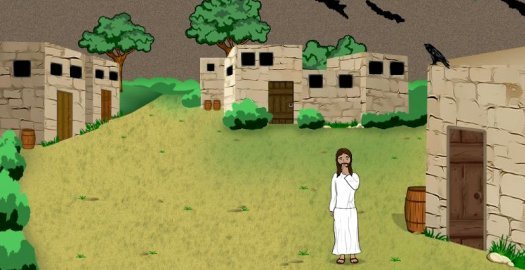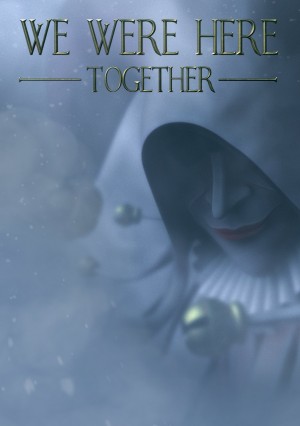Review for The Secrets of Jesus

The Secrets of Jesus is a parody of the life of Christ, a what-if scenario of what would have happened if Jesus hadn’t been crucified but had been rescued from his impending death. While it’s an interesting idea, albeit one that has been explored a number of times – probably most famously in Dan Brown’s novel (and movie) The Da Vinci Code – unfortunately the game fails to deliver in almost every other way, making the three or so hours of play time feel like a lot more.
The first major issue that should be addressed is that of religion and parody. I think it’s fair to say that if you’re a person of devout Christian faith, it’s entirely possible you’re going to find even the premise that he didn’t die at his crucifixion offensive, let alone the way it portrays Jesus as having OCD and allergic reactions that cause flatulence. If you’re fine with that level of lampooning, you’ll probably really appreciate the writing which has Jesus (and others) quote or paraphrase his own words from the Bible.
On the other hand, for those without a Christian background, it’s entirely possible you’ll not understand why the protagonist is saying what he says, which makes the conversations he is involved in longwinded and, quite honestly, boring. Indeed, whatever isn’t a direct quote instead tends to reference Jesus’s parables and stories or other events detailed in the Bible. If you don’t have a basic knowledge of this source material, you’re more than likely going to wonder what the heck he is talking about most of the time.
Either way, there are some glaring mistakes that indicate the author should have done a little more basic research. For instance, at one point early on Jesus says that he has been in hiding at his cousin John’s house, John being a homeless and wretched fisherman who became one of his disciples. It’s a basic error as there are really two Johns (one being Jesus’s cousin, the other his disciple), and while being a spoof gives the game a certain leeway for artistic license, factual mistakes such as this show a lack of attention to detail.
A parody works by finding holes in the subject matter and poking fun at it, and in this case the plot is enough to grab a player’s interest. It seems that along with his Jewish disciples, Jesus had fans amongst the Romans who warned him of his impending arrest, helping him to escape his execution. Deciding that Roman-ruled Palestine isn’t the place he should be anymore, Jesus decides to flee back to India, where he had spent 15 years of his younger life, taking with him the love of his life, Mary Magdalene. Mary, of course, will go with him but first she needs to make sure her father Aram is alive and well.
Mary’s father, it turns out, entered the local town of Magdala but didn’t return. Although she’s not entirely sure where he might be, it’s likely he’s with one of three people: Rahab, a local prostitute; Felix, whom Ahab owes money to; or Jesus Barabbas, a local thug who was imprisoned with Jesus at the same time yet released by the Romans at the behest of the crowd. Jesus asks if Rahab is the same prostitute mentioned in early Jewish writings, to which Mary mocks him by saying that it obviously wasn’t as she has been dead for centuries, and it’s just a coincidence that they share the same name. This sort of dialog is an example of the completely pointless way The Secrets of Jesus shoehorns pieces of the Bible into the story without any real reason. You now know, if you didn’t already, that there is a story about a prostitute named Rahab in the Bible, but this does nothing to advance the story and just serves to muddy the game’s own narrative.
Conversations are handled through a choice of responses but it doesn’t take long to realise that your replies don’t appear to make a difference. They’re simply there as a means to an information dump, which is fine sometimes but becomes wearisome when that’s all the conversations are good for. This is compounded by how wordy each exchange is, such the answer from Felix’s unnamed wife to Jesus asking about the soup she is stirring: “My husband was always quite sorrowful lately and not very amenable. His trade did not go as he wished. He practically only sells his lentils, which are currently not as requested anymore. Particularly after I came up with my recipe for the lentil soup and started to give it out freely, nobody needs to buy lentils anymore.” This is a typical example of the overwritten nature of the script, which continues right throughout the game.
Another area where the writing is lacking is the way the characters, usually Jesus, speak to nobody in particular. This is most notable in the introduction, where a modern-day fisherman is plying his trade while narrating a long explanation of how his efforts have been unfruitful, possibly due to overfishing, and he will have to eat pizza again that evening. This conversation with himself feels forced and serves only to set up the plot of the game when a note-in-a-bottle bumps up against his boat that reveals the secrets of Jesus. A little more subtlety here, and in the many places where Jesus speaks aloud just to convey information to the player, would have been appreciated.
The Secrets of Jesus is of course set in first-century Palestine and the artwork makes a reasonable attempt at replicating this, albeit in a cartoon way. A lot of the backgrounds are painted using a range of yellow colours, which is understandable in the sunny, somewhat arid Middle East, yet by overuse they tend to make everything look washed out and same-same. The main area, the local town where Jesus is looking for the three people who might help locate his future father-in-law, is rather dreary-looking and most of the buildings have no texture, so they look flat and lifeless against the sand and blue sky. There are a couple of nice backgrounds that break up the monotony a bit, like the bright greens at the place where Jesus stops and sees a person preaching on a hill, or the Sea of Galilee where a drunken fisherman refuses to look at Jesus.
One of the few highlights of the game is its character animations. Jesus, who looks like what we’ve come to expect from Western depictions of him with his white robe, sandaled feet, and slightly dark complexion, is the best-animated character and has a wide range of smooth and realistic motions such as looking up to the sky and patting Mary on the head, but a particular instance that stood out for me was that of a potter using a period-authentic pottery wheel.
Starting with music that evoked in me the feeling of being in the Middle East, the soundtrack is nicely composed, mainly using an acoustic guitar and piano. The rhythmic sound suits the setting perfectly, and would surely have been a high point if not for the fact that you quickly realise there only seem to be a few themes and they are used so often that they become repetitive.
You control Jesus using a standard mouse interface, left-clicking to walk or interact, right-clicking to get a hotspot description. Moving the cursor to the top of the screen brings up your inventory as well as the main menu from which you’re able to save, restore and quit the game. Hovering over areas you are able to interact with generally brings up a description such as the misspelled “Synagog door,” while pressing the space bar will show all the hotspots that are able to be interacted with. A nice little feature is the inclusion of buttons that will instantly transport Jesus back to major locations such as Mary’s village or to the town where her father disappeared. It’s a nice quick-travel option as I frequently had to visit both places.
One major criticism of the controls relates to navigating between screens. Some areas will show arrows indicating you can walk a certain way but this isn’t consistent across the game. One screen may show these arrows for exiting left and right, while a nearly identical screen doesn’t. It makes for frustrating gameplay as the exits without an arrow indictor seem to have very small activation zones, so you need to click around a bit before Jesus will move to the desired screen.
The puzzles are standard adventure game fare, with nothing terribly exciting or noteworthy about them except for the fact that they use a large amount of moon logic. One early example is when Jesus’s path is blocked by two rabbits – normal-sized rabbits which any normal person could easily step over, let alone walk around, yet Jesus for some reason is scared of them. An intuitive option to move the rabbits away would be to use the carrot you pick up in the village, but this doesn’t work and the actual solution is in no way signposted or even remotely logical. While this is not a typical inventory puzzle in the game, it does perfectly showcase how overcoming obstacles is more about thinking like the developer than using in-game logic.
When dealing with subject matter such as the story of Jesus, it’s a choice of either showcasing it with respect and appreciation or spoofing it and mining it for every possible joke. If you’re expecting either a reverent religious exploration or a wicked satire of the life of Christ, you’ll instead find a bland disappointment that takes the safe middle road. Ultimately The Secrets of Jesus is a letdown not for any blasphemous reasons but simply because every time it offers a glimpse of something good, it does even more that takes away from it. For a parody, it’s no Monty Python’s Life of Brian; in fact, it is barely able to get a chuckle from what could be a gold mine of puns and black humour. And as an adventure game, it offers nothing new or interesting that would make me want to play it again or, indeed, recommend it to anyone else to play. This is one game that fails to execute in more ways than one.
WHERE CAN I DOWNLOAD The Secrets of Jesus
The Secrets of Jesus is available at:
- Itch.io -70%
Our Verdict:
The Secrets of Jesus has a great premise for parody of a topic that few people would be game enough to attempt, but the execution is awful in delivering a wordy mess that makes little sense and, more importantly, is just plain uninteresting and a labour to play.



_capsule_fog__medium.png)























